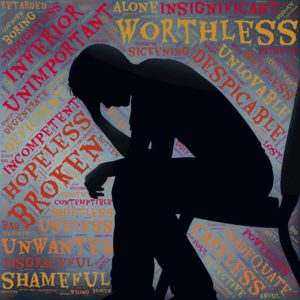 “I’m just in a rut.” “I feel like I’m in a bit of a funk.” “I have a case of the Mondays.” “I’m down in the dumps.” You’ve probably heard someone say these phrases in passing, or maybe you’ve said them yourself.
“I’m just in a rut.” “I feel like I’m in a bit of a funk.” “I have a case of the Mondays.” “I’m down in the dumps.” You’ve probably heard someone say these phrases in passing, or maybe you’ve said them yourself.
They are common phrases to use when someone is explaining how their mental health and well-being isn’t functioning at its normal level.
When our mood shifts in a downward direction, it isn’t always something to cause serious alarm. It’s normal to have short-lived experiences where our emotions lean toward sadness, loneliness or even despair.
These shifts in moods can be caused by sleep deprivation, life stressors, or unmet expectations and often work themselves out over time. We may not perform or behave to the best of our abilities, but ultimately we return to our regular functioning, and the mood change is largely harmless to our overall quality of life. Redding Christian Counseling can provide support during these times, helping individuals navigate temporary mood shifts and regain balance.
What is Depression?
Depression is different than occasional sadness that accompanies a negative review at work or grief over a relationship ending. When depression makes its appearance, it can impact every area of life including your thoughts, feelings, and actions. It’s not a short-lived mood shift, but a long-term battle that usually impedes your ability to work, finish personal tasks, or interact with family and friends.
The Oxford American Dictionary defines depression as a “mental condition characterized by feelings of severe despondency and dejection, typically also with feelings of inadequacy and guilt, often accompanied by lack of energy and disturbance of appetite and sleep.”
According to the World Health Organization (WHO), there are more than 300 million people who suffer from depression in the world. This number shows us that depression is common and that there’s is nothing wrong with you if you find yourself facing depression today.
Watch for these Signs of Depression
You might be wondering what signs to look for in someone who is living with depression. Here are a few signs that could indicate depression.
Loss of interest in enjoyable activities
If a person at one time loved to go work out every day, but now can’t seem to bring themselves to leave their house that could be a sign of depression. If there’s an activity that previously brought you joy, but no longer is valuable to you then you might be experiencing depression.
![]() Let’s say a father loved to play outdoors with his kids every evening after work. Suddenly, he loses his job. After weeks of looking for a job he begins to feel despondent and stops playing with the kids or finding enjoyment in his life. He might force himself to do it, knowing the kids are counting on him, but inwardly his emotions are not matching his outward actions.
Let’s say a father loved to play outdoors with his kids every evening after work. Suddenly, he loses his job. After weeks of looking for a job he begins to feel despondent and stops playing with the kids or finding enjoyment in his life. He might force himself to do it, knowing the kids are counting on him, but inwardly his emotions are not matching his outward actions.
When you see someone abruptly stop doing an activity they love, it could be a sign of depression. It’s important to talk to that person and recommend finding a trusted therapist to work through the symptoms of depression effectively. Depression can be healed and you are not stuck in a permanent state.
Altered sleeping habits
When someone has depression, often their sleeping habits are dramatically changed. This could include finding it challenging to fall asleep, experiencing interrupted sleep during the night, waking up in the middle of the night and being unable to fall back to sleep, or constantly waking up very early in the morning. Not only is this a sign of depression, but sleep problems can cause negative side effects in every area of life.
Feeling hopeless
 Feelings of hopelessness occur frequently in depressed people. You become downcast and might have thoughts such as, “Why should I even bother?” Everything can feel hopeless and like life will never get better. You might feel like living without depression is impossible and so you shouldn’t even put in any effort in your recovery.
Feelings of hopelessness occur frequently in depressed people. You become downcast and might have thoughts such as, “Why should I even bother?” Everything can feel hopeless and like life will never get better. You might feel like living without depression is impossible and so you shouldn’t even put in any effort in your recovery.
Fatigue/low energy/lethargy
It’s normal to have fatigue if you are working long hours or performing a physically demanding activity. However, those suffering from depression may have an overwhelming desire to hide in their beds and not leave the house. It can feel like life has lost its appeal and the depression is siphoning all your energy. You might be too tired to do simple tasks like unload the dishwasher, take a shower or go to the grocery store.
Change in social functioning
It’s true that not everybody would define themselves as social butterflies, but depression intensifies actions of isolation. Let’s say Melissa always enjoyed her Thursday night girls’ night, but now never shows up and rarely responds to texts or gives excuses for her absence.
Depression can even make people more easily irritable. You may usually keep your cool, but find yourself agitated when having discussions with other people. Social interactions can become more exhausting and stressful when you are experiencing depression.
Difficulty thinking or concentrating
Depression can make it difficult to make decisions, focus on a television show or concentrate on a book. A lack of concentration coupled with lethargy creates a situation where a person can just lie in bed with thoughts bouncing around in his mind. Your mind might constantly be wandering during conversations instead of focusing on the person.
Change in appetite
Depression can cause someone to look to food for comfort or as an attempt to heal their pain. It’s normal to indulge in certain foods as a way to cope with unwelcomed emotions. On the other end, some people lose the desire to eat no matter what is given to them. Weight loss or weight gain is a common effect of depression.
Suicidal thoughts
A person who is depressed might think about what death is like, how to end their life or that the world would be a better place without them. The pain can become so much to bear that thoughts of suicide become prevalent.
Decline in self-care

A person with depression might stop taking a shower, brushing their teeth or styling their hair. A person who once ironed their clothes and took care of their personal grooming might end up with an unkempt beard and disheveled clothes. There are many ways a decline in self-care can manifest in people.
Someone who always dressed sharply might find herself wearing the same sweatpants and shirt multiple days in a row. She forgets to apply deodorant and brush her hair. Normally, the person no longer cares about their appearance and doesn’t have the energy to do anything about it even if they did.
Getting Help for Depression
Depression is not a sign of weakness, but it can have serious implications for normal functioning in life. Depression is like a cloak that covers you every moment of the day. It’s not something you can just will yourself out of or wake up one morning and decide to not be depressed.
Finding a Christian counselor that you trust is a great next step to begin working through your depression and discovering a custom-tailored path toward healing and recovery. You do not have to feel helpless every day. A family doctor can also help recommend options based on your personal experience. You are not alone. Your pain is real, and healing can happen. Take the brave step forward and reach out to a counselor today at Redding Christian Counseling.
“Depressed,” courtesy of johnhain, pixabay.com, CC0 License; “Depressed”, Courtesy of Rawpixel, Unsplash.com, CC0 License; “Depressed”, Courtesy of Nathan Cowley, Pexels.com, CC0 License; “Sad,” courtesy of Joyce Huis, unsplash.com, CC0 License



